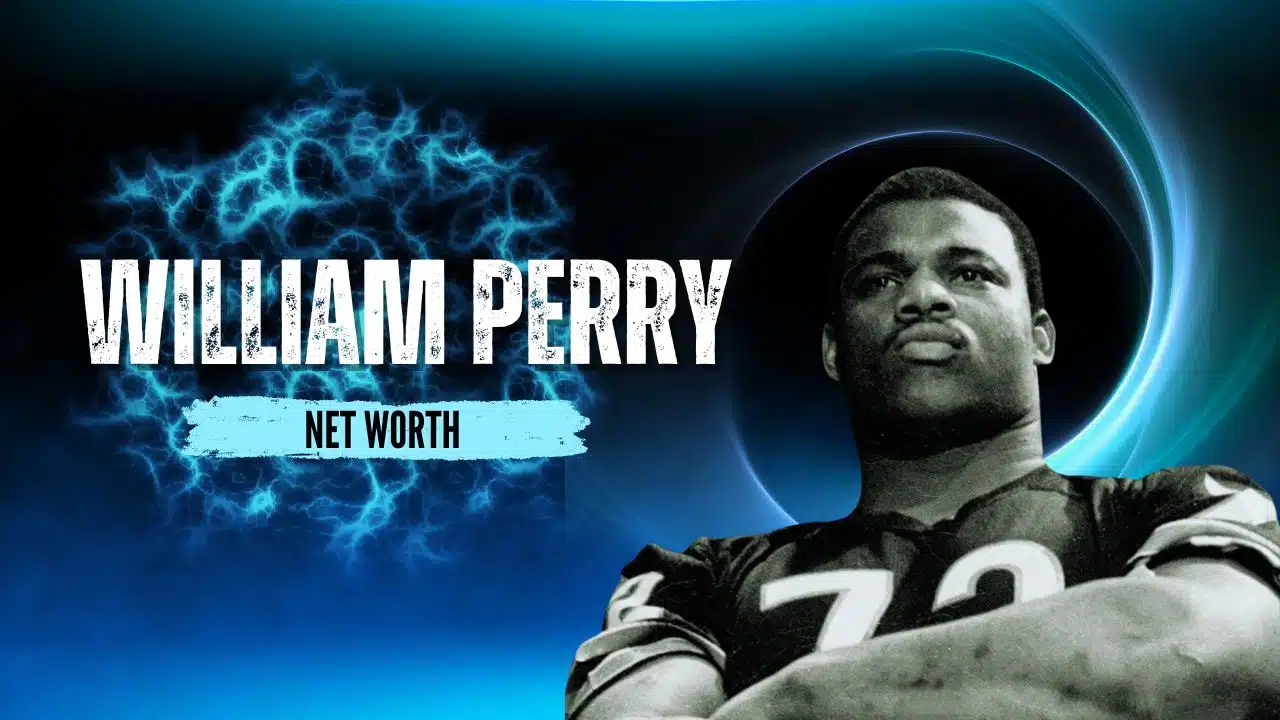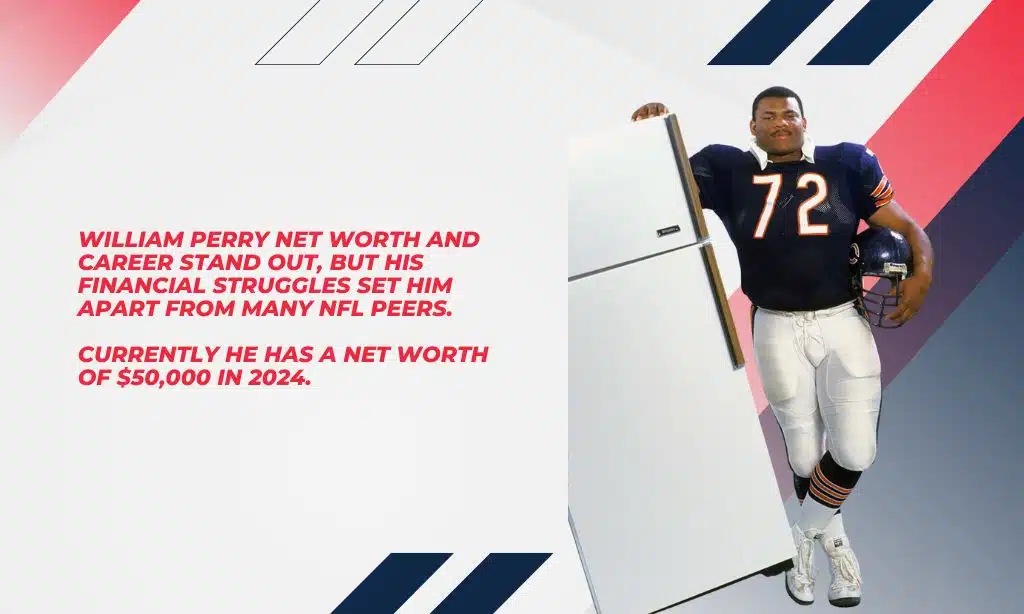Money troubles can hit anyone, even famous athletes. Many NFL players earn big during their careers but face financial struggles after retiring. This leaves fans wondering how it happens and what lessons they can learn.
Take William “Refrigerator” Perry, for example. Known for his time with the Chicago Bears and Super Bowl XX victory, his money story is surprising. In this blog, we’ll explore William Perry net worth—his earnings, losses, and lessons from his journey.
Keep reading!
Career Highlights and Achievements
William “Refrigerator” Perry made a big name as a defensive lineman in the NFL. His strength and unique style left a lasting mark on football history.
Early NFL Career
Drafted in the first round of the 1985 NFL Draft, he was picked 22nd overall by the Chicago Bears. He had impressed during his college years at Clemson University from 1981 to 1984.
The defensive lineman made a strong debut with head coach Mike Ditka’s team. Known as “The Refrigerator,” he quickly became famous for his size and skill on the field.
Super Bowl Success with the Chicago Bears
The 1985 Chicago Bears dominated the NFL, finishing with a 15-1 record. William “Refrigerator” Perry was a key player on this team. Under coach Mike Ditka and defensive coordinator Buddy Ryan, the team crushed opponents.
On January 26, 1986, they won Super Bowl XX against the New England Patriots with a score of 46-10. Perry made history by scoring a touchdown during that game. His Super Bowl ring is legendary—size 25, the largest in NFL history!
Other Notable Accomplishments
William Perry made a mark outside football too. In 1986, he joined WWF WrestleMania 2 and later entered the WWE Hall of Fame in 2006. His fame grew with TV roles, appearing on _The A-Team_ and _Windy City Heat_.
In music, he recorded three rap tracks in 1985, teaming up with Walter Payton for “Together.” He even took part in Nathan’s Hot Dog Eating Contest in 2003. These ventures added to his icon status beyond being a defensive lineman.
Sources of Income
William Perry earned money in several ways during his career. His prominence as a football player paved the way for additional sources of income.
NFL Contracts and Salaries
Perry earned about $330,000 yearly during his time with the Chicago Bears. He played for them until 1993. His contract reflected the earnings common in the NFL during that era.
He joined the Philadelphia Eagles in 1994 to close out his NFL career. The salary structure then was lower than today’s standards. Perry’s attempt at a comeback in 1996 with the London Monarchs likely brought smaller paychecks compared to his prime NFL days.
Endorsements and Sponsorships
William “The Refrigerator” Perry became a fan favorite during Super Bowl XX. His cheerful personality made him stand out in the 1985 Chicago Bears team. Companies noticed and offered him many endorsement deals.
He earned more sponsorships than most of his teammates that year.
He appeared in ads, TV shows like *The A-Team*, and even had a GI Joe action figure made after him. These deals added to his fame and wealth during the height of his career.
Media and Public Appearances
He appeared in WWF WrestleMania 2 back in 1986, adding to his fame. TV shows like _The A-Team_ and movies such as _Windy City Heat_ also showcased his personality. These roles boosted his public image while earning him extra income.
In 2003, he joined Nathan’s Hot Dog Eating Contest, drawing fans’ attention again. Commercials further added to his earnings during peak years. His media work helped cement him as a cultural icon beyond football.
William Perry Net Worth Estimation
William Perry net worth reflects his NFL career, endorsements, and financial struggles—explore the details ahead!
Current Valuation
William Perry net worth Estimates place his 2024 net worth between $10,000 and $50,000. His financial struggles have shaped this low valuation despite his NFL success. Perry’s Super Bowl XX ring fetched $200,000 at a 2015 auction.
This sale reflected both his fame and money troubles.
Many factors contributed to this decline in wealth. Health issues like Guillain-Barré syndrome added medical costs over the years. Debt challenges also played a role, including trouble with the IRS.
Despite earning significant sums during his career, long-term saving or investing seems limited—impacting overall stability now.
Financial Challenges Over the Years
William “Refrigerator” Perry dealt with serious money problems. Poor financial planning, high medical bills from Guillain-Barré syndrome treatment, and struggles with alcohol drained his savings.
He also had trouble managing IRS debt and lived in a retirement home by June 2016 due to limited funds.
His NFL pension helped but wasn’t enough to cover everything. Rising healthcare costs added pressure on his finances over time. Mismanagement of investments made matters worse, leaving him without key safety nets like diversified investments or savings for emergencies.
Assets and Investments
William Perry owned properties and made key investments during his career—his choices reveal much about his approach to finances.
Real Estate Holdings
Perry has lived in his late father’s home in Aiken, South Carolina. This property holds sentimental value but may not be a significant financial asset due to market changes.
He later moved into a retirement home, signaling possible financial shifts. Changes in housing prices and liquidity challenges could have influenced these decisions. Property values and economic cycles often impact such moves.
Other Notable Investments
His Super Bowl ring brought $200,000 at a 2015 auction. This high-value sale showed the strong demand for sports memorabilia.
He also explored business ventures like appearances in media projects such as “The A-Team” and “Windy City Heat.” These roles boosted his public image and added to his income streams over time.
Expenses and Financial Obligations
William Perry faced rising medical bills and personal costs—read on to explore how these impacted his finances.
Lifestyle and Personal Expenses
Perry had a life filled with highs and lows. In his peak NFL days, he lived comfortably but faced challenges later. He struggled with financial mismanagement, including debts and unpaid taxes like IRS debt.
This impacted his lifestyle significantly.
His health issues also added to his expenses. Medical bills from Guillain-Barré syndrome ate into his savings. Alcohol problems further strained finances, making daily living costlier over time.
Medical Costs and Health-Related Spending
In 2007, William “The Refrigerator” Perry faced Guillain–Barré syndrome. This condition led to high medical costs. By April 22, 2009, he was hospitalized again with complications from the illness.
His health struggles didn’t stop there—he also battled diabetes.
In 2016, his weight rose above 425 pounds. Doctors warned of a possible leg amputation during treatment for diabetes. These medical issues added to his financial burdens over time.
Health care became one of his biggest expenses as treatments and hospital stays piled up over the years.
Legacy and Impact
William Perry left a big mark on football and pop culture—his story inspires fans and athletes alike.
Influence on Popular Culture
Perry’s nickname, “The Refrigerator,” became a cultural icon. It started during his Clemson University days and stuck throughout his career. In 1985, he joined “The Super Bowl Shuffle” music video with the Chicago Bears.
The video gained massive attention and highlighted his fun personality.
He appeared in shows like “The A-Team” and movies such as “Windy City Heat.” Fans loved seeing him outside football, which boosted his fame. During that era, his charismatic persona seamlessly connected sports and entertainment.
Contributions to Sports History
William “Refrigerator” Perry made history in Super Bowl XX. The Chicago Bears crushed the New England Patriots 46-10, and Perry scored a touchdown as a defensive tackle—rare for his position.
His size 25 Super Bowl ring remains the largest in NFL history.
He also played a role in popularizing players with unique personalities. Fans cherished his playful nickname and captivating persona. This helped make football more entertaining beyond just the game stats.
How William Perry Compares to Other NFL Players
William Perry net worth and career stand out, but his financial struggles set him apart from many NFL peers—keep reading to see how he measures up.
Financial Comparisons with Peers
Many fans often wonder how William Perry’s finances stack up against other NFL players from his era. Despite his career’s high points, his financial trajectory differs significantly from some of his peers.
| Player | Career Earnings | Net Worth (2024) | Main Income Sources |
|---|---|---|---|
| William Perry | $2–$4 million (approx.) | $10,000–$50,000 | NFL contracts, endorsements |
| Dan Hampton | $10+ million | $500,000–$1 million | NFL contracts, speaking engagements |
| Mike Singletary | $8–$12 million | $8–$10 million | NFL, coaching, media |
| Jim McMahon | $7–$10 million | $1–$2 million | NFL, endorsements |
Perry’s earnings during his prime were solid but didn’t match the financial planning of some contemporaries. He earned roughly $330,000 annually with the Chicago Bears. His estimated 2024 net worth of $10,000–$50,000 highlights struggles post-retirement.
By comparison, Mike Singletary transitioned into coaching and media, securing long-term financial stability. Jim McMahon also managed a stronger post-NFL financial footing.
Some peers like Dan Hampton saw modest earnings yet kept higher net worth due to better financial management. Perry’s challenges likely stemmed from early medical costs and lifestyle choices.
Career Longevity and Earnings
To understand William Perry’s financial journey, it’s essential to examine his career length and the earnings he accumulated. His time in the NFL spanned nearly a decade, providing both opportunities and challenges, especially in managing finances. Here’s a breakdown of his career and corresponding earnings:
| Year | Team | Salary/Earnings | Key Highlights |
|---|---|---|---|
| 1985 | Chicago Bears | $275,000 (approx.) | Rookie year, Super Bowl XX win |
| 1986 – 1993 | Chicago Bears | $300,000–$600,000 annually (estimated) | Played in 123 games, contributed 29.5 sacks |
| 1993-1994 | Philadelphia Eagles | $400,000 (final year) | Wrapped up NFL career, 138 games played in total |
His career started strong with the Chicago Bears, who signed him in 1985. That year marked a historic win at Super Bowl XX, boosting his visibility. Perry stayed with the Bears until 1993, earning a solid salary that reflected his contributions on the field.
The final chapter of his NFL career came with the Philadelphia Eagles in 1994. By that time, his earnings had peaked near $400,000 for the season. Overall, his playing years added up to 138 games, with 29.5 sacks and 3 offensive touchdowns—proof of his versatility and impact.
While salaries in the 1980s and 1990s were far lower than today’s NFL contracts, Perry’s achievements and popularity helped him earn a comfortable income during his prime. However, the shift in NFL earnings over time highlights the financial disparity players from his era often face today.
Lessons from William Perry’s Financial Journey
William Perry’s life shows how crucial financial planning is. Diversifying investments can protect income during tough times. His reliance on NFL earnings highlights the risk of not having multiple sources of income.
Athletes like him often face economic downturns after retirement if they lack other revenue streams.
His challenges with IRS debt and medical bills underline the need for smart expense management. Unexpected costs, such as treatment for Guillain-Barré syndrome, strain finances without proper savings or insurance.
Learning to balance spending and saving helps avoid similar struggles. Financial education can make a big difference in long-term stability.
Takeaways
Money can be tricky, even for famous athletes. William Perry net worth story shows how fast fortunes can change without proper planning. His journey is a reminder of the value of managing money wisely.
Learning from his experience, future players can avoid similar struggles. Success on the field doesn’t always mean success off it.






































